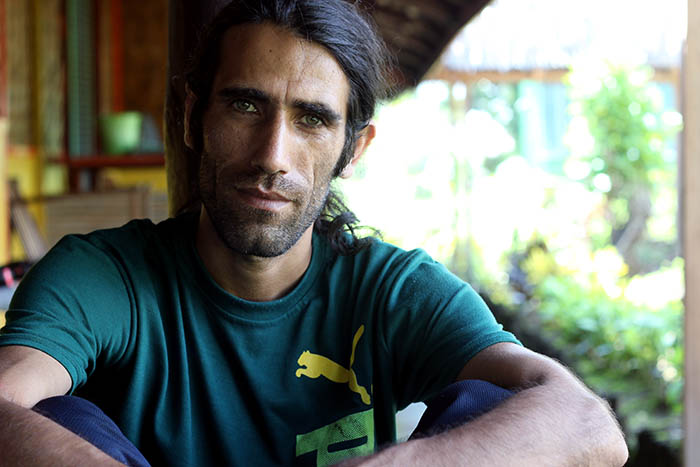[vc_row][vc_column][vc_column_text]

Behrouz Boochani, Manus Island
Manus Island is the location of a controversial detention centre which the Australian government uses to hold over 1,000 asylum seekers indefinitely. It is also home to Iranian journalist and 2017 Index journalism award nominee Behrouz Boochani.
His film Chauka, Please Tell Us the Time, which exposes the realities of life as a detainee on Manus Island, has been selected for the London Film Festival in October after premiering at the Sydney Film Festival in June 2017. Shot with a smartphone acquired in return for his shoes, the feature length film exposes daily life as a Manus Island inmate.
Journalists are banned from the island but Boochani hopes that his film will expose the horrible conditions of the detention centre. He was forcibly relocated there after attempting to seek asylum by boat in May 2013. The Kurdish cultural magazine he wrote for had been raided and 11 of his colleagues were arrested forcing him to flee his native Iran.
Boochani was denied a visa to attend the premiere in Sydney but is hopeful of attending the London screening having written to the High Commissioner of the UK to Australia and the Sadiq Khan, the Mayor of London.
“The London Film Festival is one of the biggest cultural events in England and cinema can make our world more peaceful and remind us that we should care about our humanity and values,” Boochani told Index. “I’m sure the people who are running this festival want to make our world better. I wrote a letter to get a visa to go and share my ideas with people in London and I’m sure that the organisers of the festival and Mayor of London will support me.”
“I hope that more people become aware of this concentration camp and know more about how the Australian government is torturing people in this remote prison,” Boochani added. “I have been working as a journalist and human rights defender in this prison for more than three years and have found that journalism is not powerful enough to tell the history of the suffering in this prison.”
Boochani had been approached in the past about making a film but did not feel comfortable until he spoke to Dutch-Iranian filmmaker Arash Kamali Sarvestan. “Although some directors made contact with me two years ago we could not understand each other,” Boochani said. “I did not want to make a simple movie but fortunately Arash could understand me.”
Making a feature-length film is hard enough, but Boochani had no previous experience. “Arash helped me a lot. We had long conversations every day and talked a lot about the shots and how we can make this movie. I’m a novelist and I think a novelist is able to do any kind of art.”
Boochani hopes his film will also show how Manus Island and its people are being affected by the centre. “A part of this movie is about Manusian people and their culture and how Australia is using this island for its political benefits,” he said.
“This movie is not only for me or Arash but is a voice of 2,000 children, women and men who have suffered under torture for more than four years and we want the world to hear their voice,” Boochani added.
He does not think that it is the current global attitudes towards refugees which are causing mistreatment of asylum seekers. “We should think deeply in a philosophical way about liberalism. Why has liberalism lost its human values? A lot of people died in Manus and Nauru but still, most people in Australia don’t care,” Boochani said.
Boochani describes Australia’s behaviour on Manus Island as a “new kind of fascism” which is “very dangerous to our values”.
Manus Island detention centre was scheduled to close last year after the Papa New Guinea Supreme Court declared it to be illegal. Many detainees now face resettlement in Papa New Guinea but face rising hostility from the locals. Many have been acknowledged as refugees but many still remain informal or waiting to know their status. [/vc_column_text][/vc_column][/vc_row][vc_row][vc_column][vc_basic_grid post_type=”post” max_items=”4″ element_width=”6″ grid_id=”vc_gid:1504690014885-9d831161-78d0-4″ taxonomies=”9020, 9030, 8148″][/vc_column][/vc_row]




